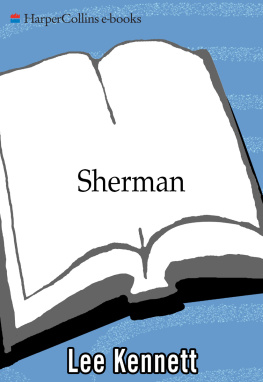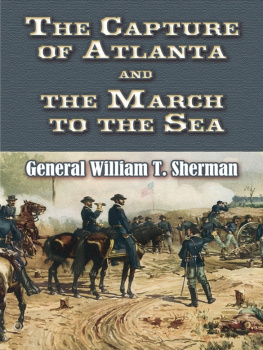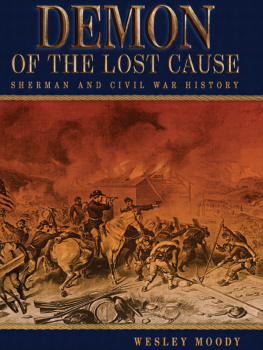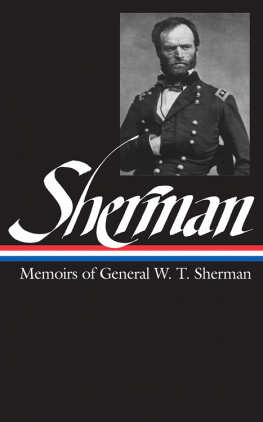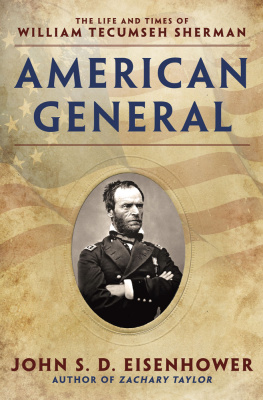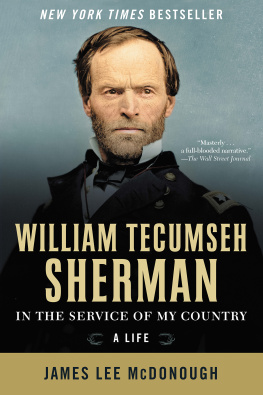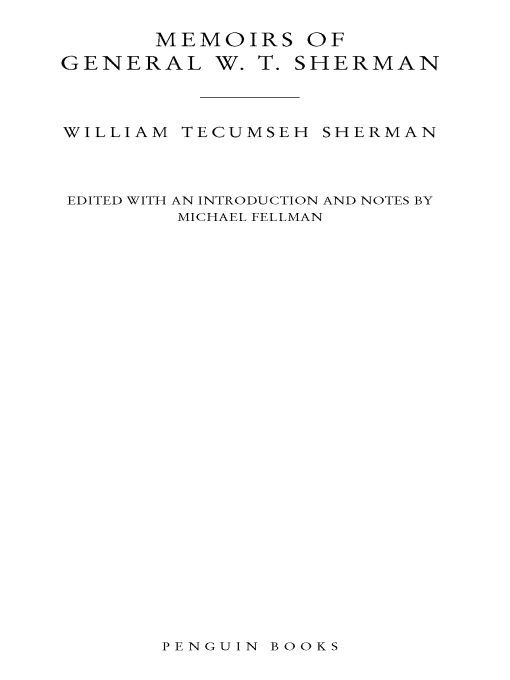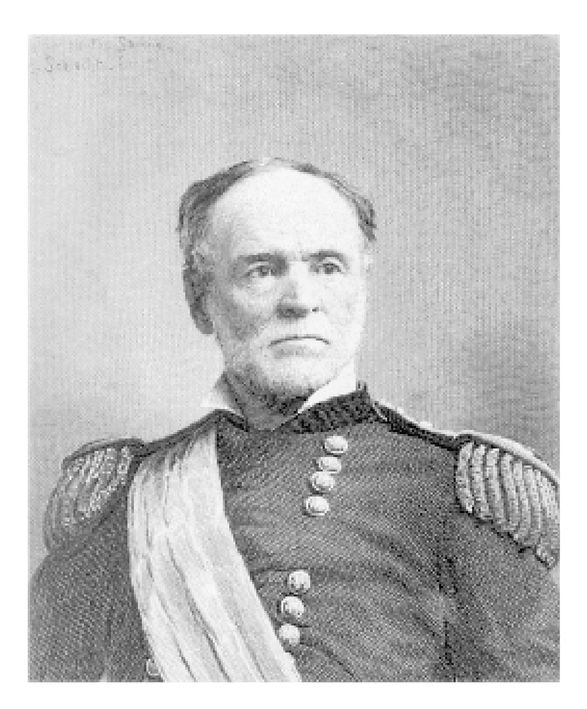Table of Contents
MEMOIRS OF GENERAL W. T. SHERMAN
TECUMSEH SHERMAN, born on February 8, 1820, in Lancaster, Ohio, was named in honor of the great Shawnee Indian leader and warrior. After his father died when he was nine, Sherman became the ward of Thomas Ewing, the most powerful Whig politician in Ohio, who had him baptized William. Ewing secured Shermans appointment to West Point, where he finished sixth in the forty-member class of 1840; Sherman then joined the artillery, serving on various frontier outposts. In 1850, Sherman married Thomas Ewings daughter, Ellen. Three years later he resigned his army commission and returned to San Francisco to open a branch of a St. Louis bank, but both the branch and the home bank failed in 1857, and Sherman drifted unhappily through a variety of jobs until he became the founding president of the military college which would later evolve into Louisiana State University. When Louisiana seceded, Sherman resigned, but he soon reentered the army as a colonel, just in time to become part of the Union fiasco at Bull Run. Promoted and assigned to the pivotal state of Kentucky, where he shortly became commander, Sherman suffered a mental breakdown and lost his post. Soon enough he returned to service in a subordinate role to Ulysses S. Grant and redeemed his reputation as a divisional commander at the Battle of Shiloh in April 1862. His reputation soared as Grants most important subordinate, and in March 1864, when Grant went east to assume overall command, Sherman replaced him in the West. After a long and arduous campaign, Sherman conquered Atlanta on September 1, 1864, a victory which secured Abraham Lincolns reelection. Sherman soon set off through Georgia on his famous and deeply destructive March to the Sea at Savannah, and his subsequent campaign northward through the Carolinas. When the Civil War ended, Sherman stayed in the West to fight the plains Indians. Following Grants election to the presidency in 1868, Sherman became commanding general of the army, a position he held until 1883, after which he retired to St. Louis and then New York. He died on Valentines Day, 1891.
MICHAEL FELLMAN is Professor of History at Simon Fraser University in Vancouver, British Columbia. His books include Citizen Sherman: A Life of William T. Sherman (1995).
INTRODUCTION
My aim then was, to whip the rebels, to humble their pride, to follow them to their inmost recesses, and make them fear and dread us (608-9).
THE HORRIFIC DRAMA of the American Civil War lifted William Tecumseh Sherman, as it did Ulysses S. Grant, from failure and despair to power and symbolic immortality. But when Grant came to write his elegantly crafted memoirs many years later, he wrapped his cloak of reserve and taciturnity tightly around his innermost feelings, while Sherman, though he of course camouflaged many memories, could not help but burst out in self-display far more candid and grandiose than was the Victorian norm.
A man who adored the theater and its denizens, Sherman staged his memoirs to make himself look not merely good, as do all memoir writers, but to resemble the star of some Shakespearean play of his own composition. Indeed, quoting the Bard, in the last line of his book he claimed the privilege of ringing down the curtain on a stellar public life that had made him a welcome guest in cabin as in palace across the broad American nation. Shermans immodesty as a military thespian was, however, more charming than annoying, in part because he always revealed more of his very human doubts and fears than he intended, and with such unabashed pleasure in his own company. Because he also was a ruthlessly sharp intellect and a writer of considerable power, his memoirs succeed in presenting a vivid picture not only of his actions and reactions, but of the world through which he moved with wit and bluster and broadsword.
In the 1875 preface to the first edition of this work, Sherman readily admitted the subjectivity of his authorship. He was not attempting a history of the war, nor even of his part in it, he tells his readers, but an aide-mmoire for the future historian when he comes to describe the whole, and account for the motives and reasons which influenced some of the actors in the grand drama of war (3). But so opinionated was the text that followed, so many were the controversies he stirred up with the other actors, who, whenever they had come into conflict with Sherman, in his opinion had so often been fools and knaves, that these memoirs aroused a swarm of criticism from traduced veterans in the press and in other books. Ten years later, when he published a second and expanded edition of his memoirs, the version before you, Sherman muted only a few of his harsher judgments, and basically threw down the gauntlet to his critics. Relativist enough to admit that no three honest witnesses of a simple brawl can agree on all the details, insisting that the United States was a free country in which each man had perfect liberty to publish his own version of past events, Sherman nevertheless asserted with his normal pugnacity, I am publishing my own memoirs, not theirs. He remained certain that his account of events was the right, or at least the rightest, one. With his pen he was continuing the war by other means: far from mellow or benign, Sherman the aging warrior, as a witness on the stand before the great tribunal of history, meant to impose his version of events as mightily as he could (5).
As all American autobiographies are said to be, Sturm und Drang notwithstanding, this was a success story, a primarily psychological rags-to-riches tale. In an upwardly circular fashion, worldly triumphs became markers and expressions of internal transformations that accompanied the impact of events.
Following the death of his honorable but rather impoverished judge of a father when he was nine, little Cump Sherman was taken up Main Street in Lancaster, Ohio, to the top of the hill, where he became the ward of Thomas Ewing, a wealthy and successful lawyer and Whig politician, sometime senator, sometime cabinet minister, who, without asking the boys opinion of the move, secured him a spot at West Point, and sent him there at age seventeen. Although his mother lived on elsewhere in Ohio, Cump rarely saw her: it was as if he had been orphaned, the most suitable start in life for the self-made American hero, from Benjamin Franklin forward, even though Sherman would enjoy the lifelong benefit of the politically powerful Ewing/Sherman clan. While his younger brother, John, the future senator, reacted to early childhood loss by becoming utterly cold and conventional, Cumps reaction was a lifelong sense of abandonment and betrayal and a compulsive need for companionship, matched by an inner sense of isolation, which would not only affect his personal relationships but would underpin his brilliantly articulated, destructive wartime role as psychological warrior against the South.
Before that unanticipated triumph, Sherman passed through decades of failure and periodic depression. Life in the peacetime army was dull and apparently insignificant, not in the least because professional soldiers were despised in nineteenth-century America as men on the sideline, parasites on the public dole, while the nation was being built by real menpioneers and entrepreneurs. And then, when the Mexican War came in 1846, a conflict in which Grant, Robert E. Lee, and countless other junior officers would serve with distinction, Sherman had the bad luck to be sent to California after it had been freed from Mexican rule, where his small unit served a policing function. I felt deeply the fact that our country had passed through a foreign war, that my comrades had fought great battles, and yet I had not heard a hostile shot, Sherman remembered (88). Then came the gold rush of 1849, when almost all the troops deserted for the main chance, and, as Sherman put it so vividly, preachers and professors forgot their creeds and took to trade (80). Although he stayed in the army, Sherman, too, cashed in on the inflationary spiral of the gold rush, as a surveyor, silent partner in a store, and real-estate speculator. This was his tentative first step from a boring and unhappy army career toward the far more insecure but alluring world of commerce.


